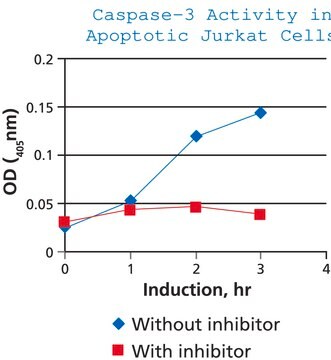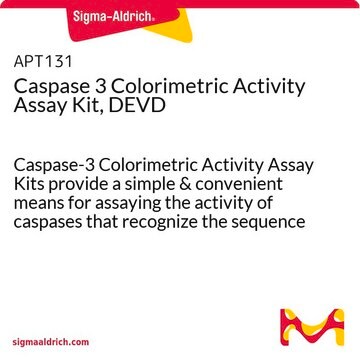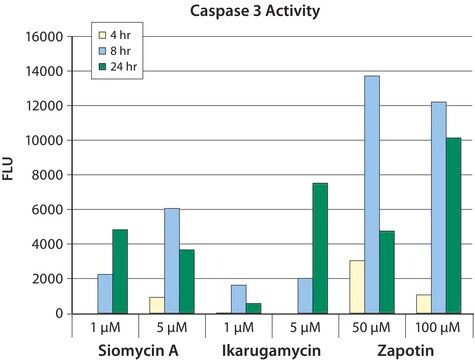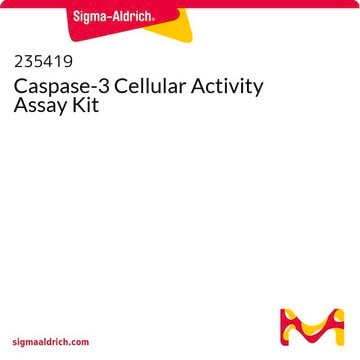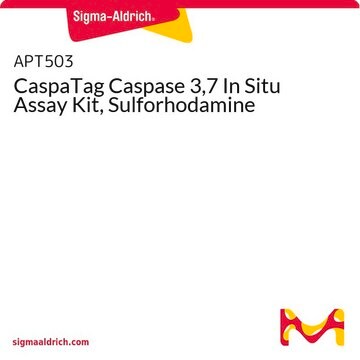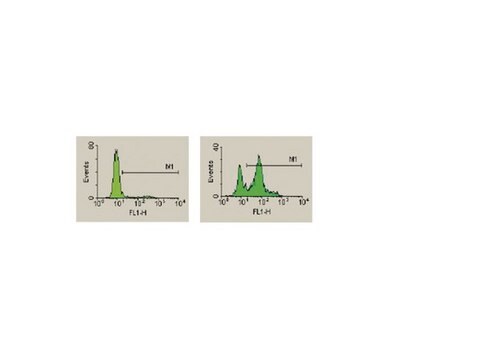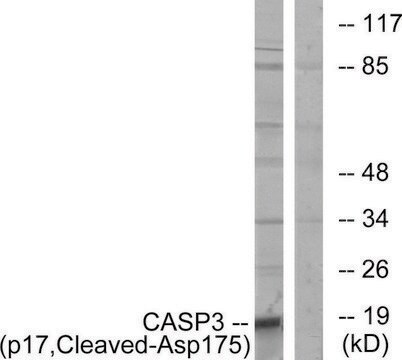APT165
Caspase 3 Colorimetric Activity Assay Kit, DEVD
Caspase-3 Colorimetric Activity Assay Kits provide a simple & convenient means for assaying the activity of caspases that recognize the sequence DEVD.
Synonym(s):
CPP32
Sign Into View Organizational & Contract Pricing
All Photos(2)
About This Item
UNSPSC Code:
12161503
eCl@ss:
32161000
NACRES:
NA.84
Recommended Products
Quality Level
species reactivity (predicted by homology)
mammals
manufacturer/tradename
Chemicon®
technique(s)
activity assay: suitable
NCBI accession no.
UniProt accession no.
detection method
colorimetric
shipped in
dry ice
Gene Information
human ... CASP3(836)
General description
Activation of ICE-family proteases/caspases initiates apoptosis in mammalian cells. Chemicon′s Caspase-3 Colorimetric Activity Assay Kits provide a simple and convenient means for assaying the activity of caspases that recognize the sequence DEVD. The assay is based on spectophotometric detection of the chromophore p-nitroaniline (pNA) after cleavage from the labeled substrate DEVD-pNA. The free pNA can be quantified using a spectrophotometer or a microtiter plate reader at 405 nm. Comparison of the absorbance of pNA from an apoptotic sample with an uninduced control allows determination of the fold increase in caspase-3 activity.
Application
Caspase-3 Colorimetric Activity Assay Kits provide a simple & convenient means for assaying the activity of caspases that recognize the sequence DEVD.
Research Category
Apoptosis & Cancer
Apoptosis & Cancer
Components
5X Cell Lysis Buffer (Part No. 90065): 5 mL
5X Assay Buffer (Part No. 90066): 10 mL
Caspase-3 Substrate (Ac-DEVD-pNA) (Part No. 90080): 1 mL of 3 mg/mL solution
Caspase-3 Inhibitor (Ac-DEVD-CHO) (Part No. 90067): 50 μL of 100 μM (0.05 mg/mL) in DMSO
pNA Standard (Part No. 90085): 250 μL of 10 mM in DMSO
5X Assay Buffer (Part No. 90066): 10 mL
Caspase-3 Substrate (Ac-DEVD-pNA) (Part No. 90080): 1 mL of 3 mg/mL solution
Caspase-3 Inhibitor (Ac-DEVD-CHO) (Part No. 90067): 50 μL of 100 μM (0.05 mg/mL) in DMSO
pNA Standard (Part No. 90085): 250 μL of 10 mM in DMSO
Storage and Stability
Store kit materials at -20°C up to their expiration date.
Special Precautions:
· After thawing reagents, use immediately or aliquot and freeze at -20oC for longer storage. Avoid repeated freeze/thaw cycles.
· The Caspase-3 substrate and pNA standard are especially light sensitive. Maintain these reagents in amber or covered containers.
Special Precautions:
· After thawing reagents, use immediately or aliquot and freeze at -20oC for longer storage. Avoid repeated freeze/thaw cycles.
· The Caspase-3 substrate and pNA standard are especially light sensitive. Maintain these reagents in amber or covered containers.
Legal Information
CHEMICON is a registered trademark of Merck KGaA, Darmstadt, Germany
Disclaimer
Unless otherwise stated in our catalog or other company documentation accompanying the product(s), our products are intended for research use only and are not to be used for any other purpose, which includes but is not limited to, unauthorized commercial uses, in vitro diagnostic uses, ex vivo or in vivo therapeutic uses or any type of consumption or application to humans or animals.
Storage Class Code
10 - Combustible liquids
Certificates of Analysis (COA)
Search for Certificates of Analysis (COA) by entering the products Lot/Batch Number. Lot and Batch Numbers can be found on a product’s label following the words ‘Lot’ or ‘Batch’.
Already Own This Product?
Find documentation for the products that you have recently purchased in the Document Library.
A B Roehl et al.
Acta anaesthesiologica Scandinavica, 56(4), 449-458 (2012-01-21)
Acute right ventricular afterload increase is a known perioperative challenge for the anaesthetic regime especially for patients with a compromised right ventricle. The accused negative inotropic action of volatile anaesthetics, with the exception of xenon, might be crucial for the
Chayanut Kaewmool et al.
Neurotoxicity research, 37(1), 111-125 (2019-09-06)
Neuroinflammation is a major factor in the pathogenesis of various neurodegenerative diseases. Microglia are resident macrophages that act as key mediators of inflammation in the brain. In response to inflammatory stimuli including lipopolysaccharide (LPS), microglial activation occurs immediately. Overproduction of
Alistair Taverner et al.
Journal of controlled release : official journal of the Controlled Release Society, 210, 189-197 (2015-05-20)
The intestinal epithelium functions to effectively restrict the causal uptake of luminal contents but has been demonstrated to transiently increase paracellular permeability properties to provide an additional entry route for dietary macromolecules. We have examined a method to emulate this
Norma Alva et al.
Experimental physiology, 98(6), 1115-1124 (2013-01-29)
There is growing interest in using hypothermia to prevent hypoxic damage in clinical and experimental models, although the mechanisms regulated by hypothermia are still unclear. As reactive oxygen and nitrogen species are the main factors causing cellular damage, our objective
Xiaoguang Liu et al.
International journal of molecular sciences, 23(15) (2022-07-29)
Ubiquitin-Specific Protease-13 (USP13) promotes protein de-ubiquitination. USP13 levels are upregulated in post-mortem Parkinson's disease, whereas USP13 knockdown via shRNA reduces alpha-synuclein levels in animal models. We studied the role of USP13 in knockout mice expressing lentiviral human alpha-synuclein and investigated
Our team of scientists has experience in all areas of research including Life Science, Material Science, Chemical Synthesis, Chromatography, Analytical and many others.
Contact Technical Service